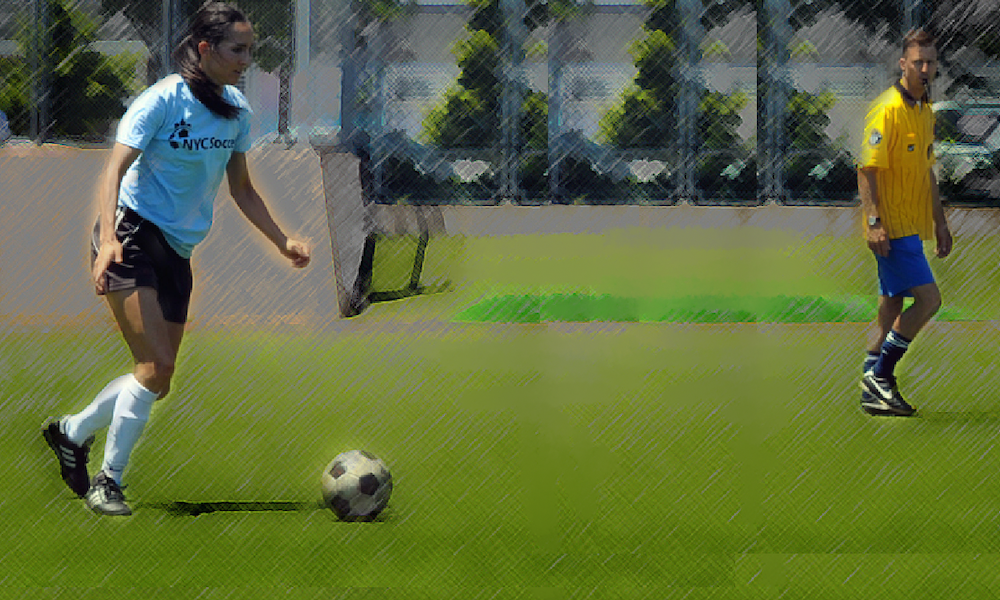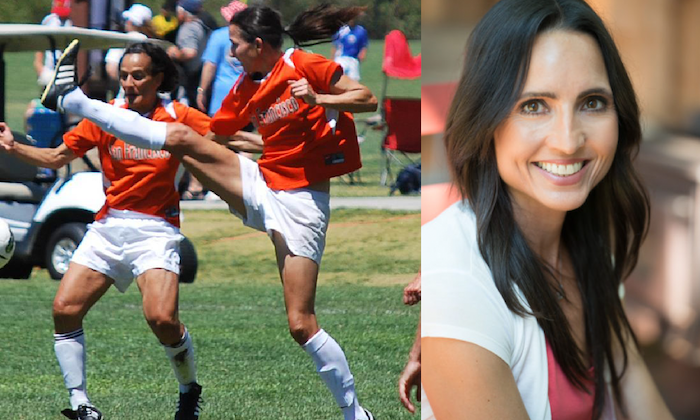
The Impact of Title IX: Women in Soccer’s Maria Murnane Shares
June 17, 2022
In our latest series, we’re honoring the upcoming 50th anniversary of Title IX on June 23 by speaking to various individuals from our network to get their thoughts on the impact of the historic legislation and their own experiences. Today, read our Q&A with Women in Soccer’s (WIS) Founding Expert Member and Producer of Brandi’s Corner, Maria Murnane.
The landmark Title IX of the Education Amendments of 1972 legislation in the United States prohibits sex discrimination (including pregnancy, sexual orientation and gender identity) in any education program or activity receiving federal financial assistance. Since its passage, Title IX has positively impacted the lives of millions of people with its non-discrimination protections applying to student recruitment, admissions, educational programs, research, housing, financial and employment assistance, health and insurance benefits, as well as health services. Although the law – requiring equal opportunity under any educational program or activity regardless of gender – isn’t specific to sports, it has greatly contributed to efforts to help level the playing field for women and girls in sports.
A former PR executive turned best-selling author, Maria played semi-professional soccer in Argentina where she joined one of the most famous clubs in the country, River Plate. She spoke to us about her sporting career and how Title IX has impacted her life.

It's been nearly a year since WIS's official launch in the US. The growing community of women and allies who work in and around soccer, connect, inspire and empower women on and off the field. The organization has over 1500 members in more than 45 states and internationally. They have influenced and impacted the sector in such a short period of time.
How long have you been with WIS and how did your journey with them begin?
I’ve been with WIS since the beginning! I worked with founder Courtney Levinsohn on the documentary short Coach, which is what led to the creation of WIS. As Courtney was out promoting the film at various events, she met many women who were doing fantastic things in the world of soccer, yet everyone was operating in silos. She created WIS so women (and allies) in the industry can network, spread the word about their organizations and projects, share best practices, find job candidates, opportunities and more.
What is your sporting background?
I’ve played soccer since I was seven, and I think there are many benefits to playing team sports, even as an adult. Leadership, understanding the value of hard work, commitment, etc. are frequently cited skills that can develop from playing on a team, but in my opinion, they are just part of the equation, and maybe not the most important part. Nearly all my friends I met playing soccer, and I continue making new friends each year with every team or pick-up game I join. Not many people I know have continued to expand their friend circle after college, yet it’s different for those of us who play adult soccer (or a team sport). There’s just something about seeing the same people week after week doing something you all love– one day you realize you are friends. It’s wonderful!
What was your path to working in sports?
It’s kind of a crazy story. One day I quit my PR job and went to Argentina by myself for what was supposed to be a two-week vacation, but I ended up staying for a year to play for River Plate (Club Atlético River Plate) of Buenos Aires, one of the largest clubs in South America and one of the most famous in the world. Each men’s professional team in the Argentinian league had a women’s arm that was essentially semi-pro, so we’d play against Boca Juniors, Estudiantes, Racing, etc. (The women’s league is fully professional now– more progress!) While I was down there, I wrote a romantic comedy called Perfect on Paper. Fast forward to 2019, by which time I’d written eight novels and was helping Courtney Levinsohn promote Coach at the espnW summit in Brooklyn, where we met [soccer great] Brandi Chastain. Brandi said she would love to read one of my books, so I sent her Perfect Paper. Much to my surprise (and delight), soon Brandi had read all eight of my books and was as big a fan of mine as I am of hers. So, when Courtney decided to build WIS, I told Brandi about it, and she came on board to host Brandi’s Corner. Sometimes things just work out.
How do you feel Title IX has impacted you?
I would say it’s affected me both as a player and a fan, but more as a fan, because the professional game didn’t exist when I was a kid (in the 70s/80s), so I had no role models to look up to. As a child, I didn’t think there were any disadvantages to being a female athlete but looking back now I realize there certainly were. Despite being a star player year after year (and eventually being named first-team all CCS in California, which was I believe comprised of 150 high schools), it never crossed my mind that one day I could (or should) earn a full ride to college – or even play in college. That just wasn’t a thing. Volleyball scholarships for girls, yes. Soccer scholarships for girls, no. That was how it was until long after Title IX passed. Even in the early 1990s, I know players who split one scholarship with their entire team and they had USWNT [United States Women’s National Team] players on their rosters.
I played soccer at Northwestern in the 1990s, but I paid to go there. Things are clearly different now and the investment in women’s sports shows on the field. I love the NWSL [National Women’s Soccer League] and the USWNT. Just last night I went to the Gotham FC vs Washington Spirit game and was in awe that the league exists. Seeing all the young girls clamoring for autographs after the game was amazing. I would have been one of those girls.
How do you feel about the impact women have had and continue to have on the world of sports?
I love it. I love the success the USWNT has had, and I love that I can turn on the TV and watch the NWSL. Even a few years ago I remember reading about WUSA [Women’s United Soccer Association] and WPS [Women’s Professional Soccer] players who had to live with host families to pay the bills, so it’s great to see more investment in the female side of the game. I also love watching/hearing female broadcasters call NBA games and MLB games– even Premier League games! It’s becoming more normalized to see women in these roles, which is what will effect real change going forward. When little boys think it’s normal to have a female coach, we know we’re making progress.
Why do you feel that it was so important to women and girls for the USWNT receive equal pay?
Increased pay will elevate global interest in the game, which will eventually elevate budgets, which will eventually elevate coaching, which will eventually elevate the talent, which will eventually elevate the product, which will eventually elevate attendance and viewership, which will eventually elevate revenue, which will eventually justify the elevated pay. It’s the good side of the chicken and egg scenario.
What improvements have you seen over your career regarding equity for women in sports?
At River Plate, we wore XL jerseys that I’m sure were recycled from one of the many male teams in the club. When we went for our medical evaluations, inevitably we’d be bumped for some male team and have to wait for hours without explanation. Once we went on a week-long road trip to the south of the country and on the way back the bus driver pulled over to the side of the road an hour out of Buenos Aires. He demanded payment before finishing the trip because he feared (or knew?) he would get stiffed if he waited for someone to send him a check after the fact. Those things were infuriating, but there was nothing we could do about them. And this was in one of the most soccer-mad countries in the world. So when I see the growth of the NWSL, despite all its challenges, it is almost hard to believe.
In your opinion, what still needs to be considered and worked on in the fight for equality for women in sports?
The argument is always that ticket sales and viewership aren’t there to support equal pay, but I think the marketing effort has to be taken into consideration. If more money went into marketing women’s soccer (think promo videos, halftime features, advertisements, etc.), who knows what impact that would have on attendance and viewership? And how are people supposed to watch women’s soccer when it’s not easy to access? I will never understand some of the programming choices on basic cable – for example, why can’t I watch college soccer - outside of the College Cup - without having to pay for yet another premium subscription? It’s another chicken/egg situation.
If a young girl were to ask you, ‘what do I need to do to be successful as a female in sports?’ what would you say to her?
Pursue what you want, and don’t take no for an answer.
Women in Soccer was an Offiicial Partner of Beyond Soccer in 2020 and 2021.